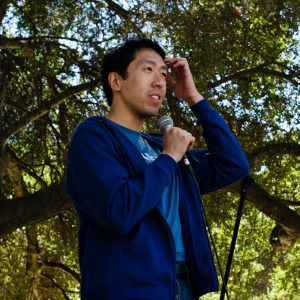Andrew Ng just told us in a Medium post he’s stepping down from his role as Chief Scientist at Baidu. This can’t come as great news for the Chinese internet company, which makes no secret of its desire to become a major player in the artificial intelligence field.
But the surprise announcement also has us wondering what the renowned AI researcher could possibly be brewing up for his next big project. Unfortunately, his post doesn’t provide much to help quench our curiosity. He very vaguely states: “After Baidu, I am excited to continue working toward the AI transformation of our society and the use of AI to make life better for everyone.”
Ng is one of those unassumingly revolutionary figures of Silicon Valley who’s dedicated his career to advancements in AI. He’s especially credited for his work in deep learning – a branch of AI that looks at how to make machines process information the way the human brain would.
And for those of us who could use a quick recap, here are some of the most fascinating things you should know about Andrew Ng:
- Ng co-founded the online learning company Coursera. He was inspired to launch the educational resource site in 2012 alongside Stanford faculty colleague Daphne Koller after a machine learning course he taught at Stanford and posted online went viral. 100,000 students signed up in its first iteration.
- Ng founded and led the “Google Brain” project developing massive-scale deep learning algorithms. Of note, he let a neural network of 16,000 computers binge watch YouTube for three days, after which it learned to recognize higher-level concepts. It even learned to pick out cats despite never being told what a cat was.
- Early on in his tenure at Baidu, Ng saw a huge opportunity in speech recognition technology and worked to produce a product called Deep Speech. It didn’t just recognize millions of words, it could parse sentences to extrapolate patterns and understand words in context. This ultimately made it more accurate than competing systems. Such strides in this field are what’s allowing us consumers to talk to our smartphones rather than type out questions and commands.
- Ng worked on facial recognition technology that uses your face to let you enter a place without needing a key or pass. The technology was showcased last year at the entranceways to the tourist town of Wuzhen, China.
Ng’s departure comes at a time when Baidu is investing more than ever into AI research. Although Baidu is best known as Google’s competitor in China for its search advertising business, the company is allocating the lion’s share of its 20 billion yuan ($2.9 billion) research budget to AI, according to Bloomberg.
It’s likely Baidu sees the same potential in this emerging technology as what Ng sees: an innovation so fundamentally groundbreaking, it will one day touch and reshape every industry.
In his post, Ng writes: “Just as electricity transformed many industries roughly 100 years ago, AI will also now change nearly every major industry — healthcare, transportation, entertainment, manufacturing — enriching the lives of countless people. I am more excited than ever about where AI can take us.”











